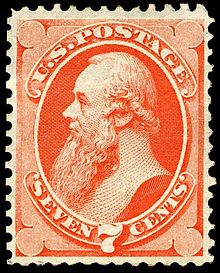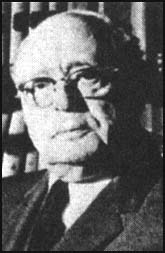40 Acres and a Mule was disallowed by Lincoln in the first place. Sherman was waay out of line.
This had nothing to do with reparations, except what revisionists have created whole cloth. The issue wasn’t
reparations for the former slaves... the issue was to get an economy going that could support 40 acres and a mule participants. And there wasn’t an economy to support it- which is why the slaves sought whatever work they could get.
Anyone who says Stanton was concerned about slaves is delusional. Stanton cared about the control of the labor force, particularly on the Westward railroad expansion. Stanton is not well liked, to the point that there are claims from both sides that he arranged the death of Lincoln- utilizing his real work— running agents against the South and turning agents to work for him. The man was a disgrace and one greedy bastard.
John S Mosby:
"40 Acres and a Mule was disallowed by Lincoln in the first place." Only in some alternate universe, pal.
In fact, Lincoln supported numerous efforts to resettle or employ freed slaves, including this one:
"In September 1863, Lincoln announced a plan to auction 60,000 acres of South Carolina land in lots of 320 acres—setting aside 16,000 acres of the land for 'heads of families of the African race', who could obtain 20-acre lots sold at $1.25/acre.
[58] Tax Commissioner William Brisbane envisioned racial integration on the islands, with large plantation owners employing landless Blacks.[59]
But Saxton and French considered the 16,000-acre reserve to be inadequate, and instructed Black families to stake claims and build houses on all 60,000 acres of the land. [60] French traveled to Washington in December 1863 to lobby for legal confirmation of the plan.[61]
At French's urging, Chase and Lincoln authorized Sea Island families (and solitary wives of soldiers in the Union Army) to claim 40-acre plots.
Other individuals over the age of 21 would be allowed to claim 20 acres.
These plots would be purchased at $1.25 per acre, with 40% paid upfront and 60% paid later.
With a requirement of six months' prior residency, the order functionally restricted settlement to Blacks, missionaries, and others who were already involved in the Experiment."
John S Mosby: "This had nothing to do with reparations... the issue was to get an economy going that could support 40 acres and a mule participants."
The issues was how to provide former slaves with a means to earn their livelihoods, period.
Calls for "reparations" (i.e., $100 trillion dollars) did not begin until the second half of the 20th century.
John S Mosby: "Anyone who says Stanton was concerned about slaves is delusional.
Stanton cared about the control of the labor force, particularly on the Westward railroad expansion.
Stanton is not well liked, to the point that there are claims from both sides that he arranged the death of Lincoln- utilizing his real work— running agents against the South and turning agents to work for him.
The man was a disgrace and one greedy bastard."
Only in your utterly confused & disoriented alternate universe, pal.
Here's what Lincoln said about Stanton:
"He is the rock on the beach of our national ocean against which the breakers dash and roar, dash and roar without ceasing.
He fights back the angry waters and prevents them from undermining and overwhelming the land.
Gentlemen, I do not see how he survives, why he is not crushed and torn to pieces.
Without him I should be destroyed."
After the war, Stanton was honored in 1869 with a US Supreme Court appointment, in 1871 appeared on a US stamp and in 1891 on US Treasury Notes.


Your claim that Stanton had something to do with Lincoln's assassination is total rubbish, invented out of thin air by an Austrian immigrant named Otto Eisenschiml in 1937.

40 Acres and a Mule was disallowed by Lincoln in the first place. Sherman was waay out of line.Sherman's arrangements were rescinded by Johnson after Lincoln's death. They were also never intended to be permanent settlements of title to land for potentially hundreds of thousands or millions of acres. Much less to serve as a precedent to be applied across the entire south.
Military officers, in the American system, simply do not have such power. Confiscate land or other property and assign it permanently to whomever they please. Nor should they.
If land was to be permanently confiscated, with proven title transferred to new owners, it would require an act of Congress. And there is considerable room for debate whether Congress would have constitutional authority to do so.
For Congress to exercise such power, the constitutional provisions about due process, act of attainder, corruption of blood, and probably several other provisions would have to be ruled inapplicable. Which could only be the case if the seceding states had actually left the Union and were now conquered provinces whose inhabitants and their property could be dealt with as the conquerors chose. The problem is that the war had been fought on the theory that it was the suppression of an insurrection, not a war against a foreign enemy.
Sherman had a problem. He had tens of thousands of ex-slaves on his hands in his department, abandoned by their masters, or fled from them. This created an immense drain on his resources, which he needed to fight a war, not to babysit freedmen.
There were also hundreds of thousands of acres of land abandoned by the legal owners which his forces were occupying. The ex-slaves were experienced farmers, for the most part.
So as a temporary expedient, he settled the ex-slaves on the abandoned land so they could support themselves until permanent arrangements were made by the appropriate civil authorities. This was obviously also in the interests of the freedmen, allowing them to be productive rather than live on castoffs of the army.
However, for purposes of discussion, let's run some numbers. 4M ex-slaves, 1M families, 40 acres per family.
That's 40M acres, 62,500 square miles.
Conveniently, just slightly larger than the state of Georgia.


